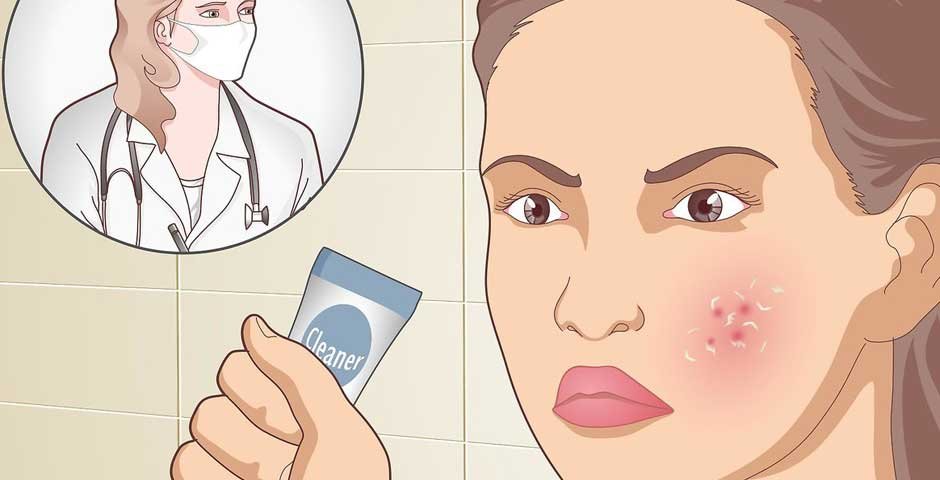Acne is a common skin problem that affects many individuals, particularly during adolescence and young adulthood. It occurs when hair follicles become clogged with oil, dead skin cells, and bacteria, resulting in the formation of pimples, blackheads, whiteheads, and other types of acne lesions.
Acne can be influenced by various factors, including hormonal changes, genetics, certain medications, stress, and lifestyle factors. Some common issues related to acne include:
- Breakouts: Acne often presents as recurrent breakouts of pimples, which can be painful, inflamed, or filled with pus. These breakouts can occur on the face, neck, chest, back, and shoulders.
- Redness and inflammation: Acne lesions can cause redness and inflammation in the affected areas. This can make the skin appear swollen and irritated.
- Oily skin: Excess oil production, known as sebum, is a common characteristic of acne-prone skin. Oily skin can contribute to clogged pores and the development of acne.
- Scarring: In some cases, severe acne can lead to scarring. This may happen when deep, inflamed acne lesions damage the skin’s collagen fibers. Acne scars can have a negative impact on self-esteem and require additional treatment to improve their appearance.
- Psychological impact: Acne can affect a person’s self-confidence and emotional well-being. It may cause feelings of embarrassment, self-consciousness, or social anxiety, particularly when acne is severe or persistent.
If you are dealing with acne, it’s important to establish a consistent skincare routine, maintain good hygiene, and consider treatment options based on the severity of your acne. For moderate to severe acne, it may be beneficial to consult a functional medicine dermatologist who can recommend appropriate prescription medications, topical treatments, or other therapies tailored to your specific needs.
Acne typically manifests as a combination of the following symptoms:
Pimples: The most common symptom of acne is the presence of pimples. These can appear as small red bumps, whiteheads (closed comedones), blackheads (open comedones), or pus-filled lesions (pustules). Pimples can occur on the face, neck, chest, back, and shoulders.
Inflammation: Acne can cause inflammation in the affected areas, leading to redness, swelling, and tenderness of the skin.
Oily skin: People with acne often have an overproduction of sebum, the natural oil produced by the skin. This excess oil can contribute to clogged pores and the formation of acne.
Scarring: In some cases, severe acne can lead to scarring. This typically occurs when deep, inflamed lesions damage the skin’s collagen fibers.
Uneven skin texture: Acne can give the skin a rough and uneven texture. It may feel bumpy or have areas of raised or indented skin.
It’s important to note that acne symptoms can vary from person to person and may range from mild to severe. If you are experiencing persistent or severe acne, it is recommended to consult a dermatologist for an accurate diagnosis and appropriate treatment.
How to treat acne naturally? Here are some approaches you can try:
Keep your face clean: Wash your face twice a day using a gentle cleanser and warm water. Avoid harsh soaps or scrubbing too vigorously, as this can irritate the skin and make acne worse.
Use tea tree oil: Tea tree oil has antibacterial properties that can help fight acne-causing bacteria. Dilute it with a carrier oil like coconut oil, and apply it to the affected areas using a cotton ball. Leave it on for 20 minutes, then rinse off. Remember to do a patch test first, as tea tree oil can cause skin irritation in some individuals.
Apply apple cider vinegar: Mix one part apple cider vinegar with three parts water and use a cotton ball to apply it to your face. Leave it on for about 10 minutes, then rinse off. Apple cider vinegar can help balance the pH of your skin and reduce inflammation.
Use a honey mask: Apply raw honey directly to your face and leave it on for 10 to 15 minutes. Honey has antibacterial properties and can help soothe the skin. Rinse off with warm water afterward.
Try a green tea compress: Brew some green tea and let it cool. Soak a clean washcloth in the tea and apply it to the affected areas for 10-15 minutes. Green tea contains antioxidants that can help reduce inflammation and fight bacteria.
Maintain a healthy diet: Eat a balanced diet rich in fruits, vegetables, and whole grains. Avoid sugary and processed foods, as they can contribute to acne. Drink plenty of water to keep your skin hydrated.
Avoid touching your face: Touching your face can transfer bacteria and oil from your hands to your skin, potentially worsening acne. Keep your hands away from your face as much as possible.
Manage stress levels: Stress can contribute to acne flare-ups. Engage in stress-reducing activities like exercise, meditation, or hobbies you enjoy to help keep stress under control.
Taking into consideration how to treat acne naturally, remember that natural remedies may not work for everyone, and it’s important to be patient and consistent with your chosen treatment. If your acne is severe or persists despite these natural approaches, it’s advisable to consult a functional medicine dermatologist for further evaluation and guidance.






